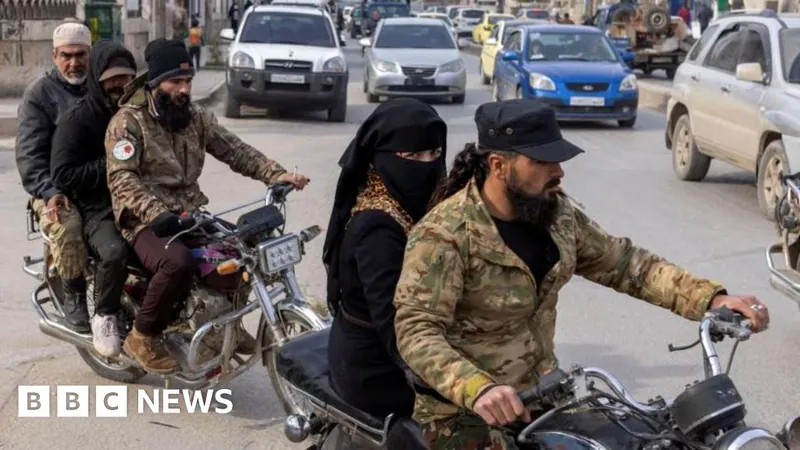
Idlib's Rebel Governance: A Glimpse into Syria's Potential Future
2024-12-18
Author: Chun
Idlib's Unique Perspective on Rebel Governance
As the city of Idlib emerges from the shadows of conflict, it offers a unique perspective on what rebel governance might mean for the rest of war-torn Syria. Nestled in the north-west corner of the country, Idlib's landscapes are still marked by the remnants of a civil war: trenches, debris-strewn streets, and the faded remnants of military might.
Not too long ago, Idlib was the last bastion of opposition control against Syrian President Bashar al-Assad's regime. Following a surprising military offensive by the Islamist group Hayat Tahrir al-Sham (HTS) that culminated in Assad’s downfall, Idlib has transitioned into a de facto autonomous region, governed by HTS. They now engage in a delicate balancing act aimed at extending their unique approach to governance across Syria as the civil war shifts dynamics yet again.
Public Order and Governance in Idlib
In central Idlib, colorful flags known for their green stripe and three red stars flutter in public squares, symbolizing the triumph over oppression. The local architecture showcases a juxtaposition of war's physical scars against newfound life, with repaired homes, bustling shops, and functional infrastructure indicating a semblance of stability. Nevertheless, residents voice concerns over HTS’s firm grip on power, describing the administration as occasionally overbearing.
A visit to Idlib reveals a surprising level of public order, with clean streets and functional traffic signals—elements sorely lacking in other parts of the country. Despite its origins linked to al-Qaeda, HTS has taken significant steps to reframe its image, proclaiming a commitment to nationalism and the promise of a unified Syria. Its leaders have openly discussed the vision of a Syria for all citizens, though the group remains classified as a terrorist entity by various international bodies including the United States and the United Nations.
Demographics and Local Improvements
Idlib is home to around 4.5 million people and showcases a relative peace compared to its tumultuous past, with the administration known as the Salvation Government focusing on public services funded by local taxes and cross-border trade with Turkey.
“Idlib used to be the forgotten city under Assad’s rule,” stated Dr. Hamza Almoraweh, who shifted from Aleppo, highlighting improvements like healthcare facilities and essential services that were previously absent. He pointed out that, despite growth, he had no intention of returning to Aleppo even post-Assad.
HTS Governance and Public Sentiment
HTS has made noticeable attempts to moderate its governance style, including relaxing previous restrictions like dress codes for women. Activists observe that recent protests against new taxation highlight a critical, albeit cautious, voice among local residents—suggesting a fledgling space for civic expression compared to the years of oppressive silence under the Assad regime.
Fuad Sayedissa, an activist originally from Idlib, now living in Turkey, echoed these sentiments: “It's not a complete democracy, but there’s freedom.” His return to Idlib after a decade underscored the psychological and social transformations following the fall of Assad.
Concerns Over Authoritarianism and Dissent
However, the seeds of discontent are not absent. Some locals criticize HTS for authoritarian tendencies, claiming that their aim to consolidate power has led to the targeting of dissenters and absorption of rival groups. Experts caution that while Idlib has seen a resurgence, the overarching concern for many Syrians remains the impending nature of continued governance across a deeply divided nation.
Cultural Shifts and Minority Rights
An hour’s drive from Idlib, the Christian village of Quniyah celebrated the fall of Assad with its first church bells ringing in ten years—a poignant symbol of tentative hope amidst fear. Here, Friar Fadi Azar noted improvements in communal freedoms under HTS, despite lingering anxiety about the future of minority groups in a region historically defined by sectarian lines.
Amid the complex social fabric of Mt. Quniyah, Azar's experiences resonate with the broader narrative: “What they [HTS] are doing now is a necessary gamble,” he admitted. “We have no choice but to trust them for the moment.”
The Fragile Balance of Power
Activist Fuad Sayedissa further emphasized the fragile balance within this new environment: “They are seen as heroes now, but we must set boundaries. Absolute power is to be opposed, be it from HTS or anyone else.”
Prospects for Syria's Future
As Idlib defines its path, the rest of Syria watches closely, hopeful yet cautious about what this new era of governance might hold. Will the framework laid down by HTS inspire a more inclusive transitional phase, or will it deepen the existing divides? As relevant as ever, the future remains uncertain in a land that is still healing.


 Brasil (PT)
Brasil (PT)
 Canada (EN)
Canada (EN)
 Chile (ES)
Chile (ES)
 España (ES)
España (ES)
 France (FR)
France (FR)
 Hong Kong (EN)
Hong Kong (EN)
 Italia (IT)
Italia (IT)
 日本 (JA)
日本 (JA)
 Magyarország (HU)
Magyarország (HU)
 Norge (NO)
Norge (NO)
 Polska (PL)
Polska (PL)
 Schweiz (DE)
Schweiz (DE)
 Singapore (EN)
Singapore (EN)
 Sverige (SV)
Sverige (SV)
 Suomi (FI)
Suomi (FI)
 Türkiye (TR)
Türkiye (TR)